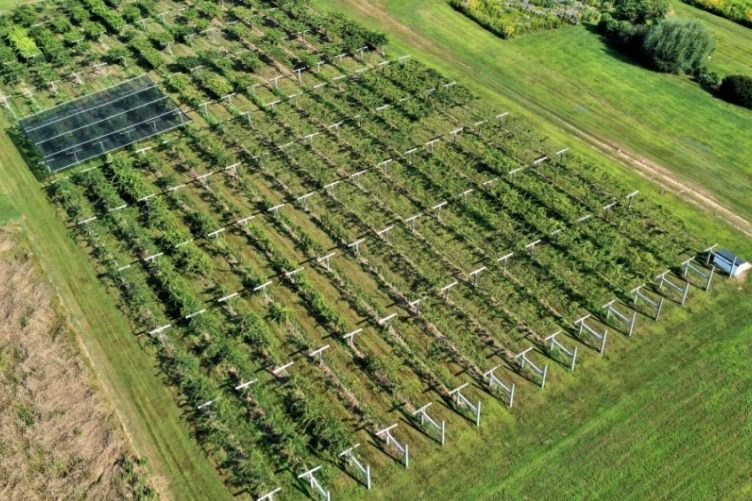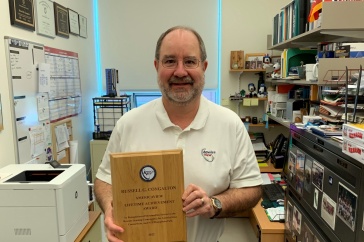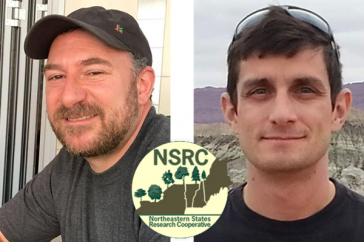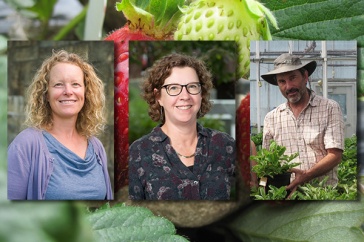
In 2013, Iago Hale, a plant breeder and associate professor of specialty crop improvement at UNH’s College of Life Sciences and Agriculture, established a kiwiberry breeding and research development program at the NH Agricultural Experiment Station’s Woodman Horticultural Research Farm.

Come learn about the commercial production of kiwiberries in New England from Will Hastings, vineyard manager and research technician for the NH Agricultural Experiment
Station’s Kiwiberry Breeding and Research Development program. Based at the University of New Hampshire, the program is the first of its kind in the nation and has established itself as a global leader in the genetic improvement of the crop.
Hastings will discuss “Growing Kiwiberries in New England” at the NOFA-NH Winter Conference Saturday, Feb. 8, 2020. The workshop will be held from 10 to 11:15 a.m. at the conference at Kearsarge Regional High School in North Sutton, and attendees will have the opportunity to provide input on the program’s breeding work.
In 2013, plant breeder Iago Hale, associate professor of specialty crop improvement, established the Kiwiberry Research and Breeding Program at the experiment station’s Woodman Horticultural Research Farm in Durham. His aim: to develop improved, economically viable kiwiberry varieties for small farms in the Northeast.
With their general adaptation to the region, their attractive appearance, intense and complex flavor profiles, high levels of bioactive compounds, and easy consumability, kiwiberries (Actinidia arguta) have long been recognized for their potential as a high-value crop in New England. A tender, smooth-skinned relative of the fuzzy supermarket kiwi, grape-sized kiwiberries are tropical-tasting fruits that have grown in the backyards and private gardens of the region for more than 140 years. Despite this long history in the region, however, virtually no commercial production exists.
“For well over a century, the potential of kiwiberry as a high-value fruit crop has been clear. In 2013, we established a long-term research and breeding program to support its development in an effort to finally provide the systematic investment needed to move the species out of backyard gardens and into commercial production. Kiwiberry production is extremely amenable to organic systems, so we are excited to share our work at NOFA-NH this year,” Hale said.
In recent decades, a few pioneering producers have experimented with field-scale kiwiberry production, demonstrating the commercial viability of the crop in our region and helping to catalyze interest among consumers. Hastings, whose graduate studies spanned cultivation and post-harvest methods for kiwiberry production, will provide a crop overview, best production practices, and information on market potential.
Hastings is co-author of “Growing Kiwiberries in New England, a Guide for Regional Producers,” an online guide that provides in-depth, regionally relevant, and updated information on the crop. Comprised of a statewide market assessment, a detailed production manual, and an enterprise analysis, the freely available guide can be found at: http://www.noreastkiwiberries.com/
More information about the conference is available at https://www.nofanh.org/winterconference. The cost to attend the conference is $95.
This material is based upon work supported by the NH Agricultural Experiment Station, through joint funding of the National Institute of Food and Agriculture, U.S. Department of Agriculture, under award numbers 233561 and 1006928, and the state of New Hampshire.
Founded in 1887, the NH Agricultural Experiment Station at the UNH College of Life Sciences and Agriculture is UNH’s original research center and an elemental component of New Hampshire's land-grant university heritage and mission. We steward federal and state funding, including support from the USDA National Institute of Food and Agriculture, to provide unbiased and objective research concerning diverse aspects of sustainable agriculture and foods, aquaculture, forest management, and related wildlife, natural resources and rural community topics. We maintain the Woodman and Kingman agronomy and horticultural research farms, the Macfarlane Research Greenhouses, the Fairchild Dairy Teaching and Research Center, and the Organic Dairy Research Farm. Additional properties also provide forage, forests and woodlands in direct support to research, teaching, and outreach.
-
Written By:
Lori Wright, '06G | NH Agricultural Experiment Station | lori.wright@unh.edu | 16038621452


















































